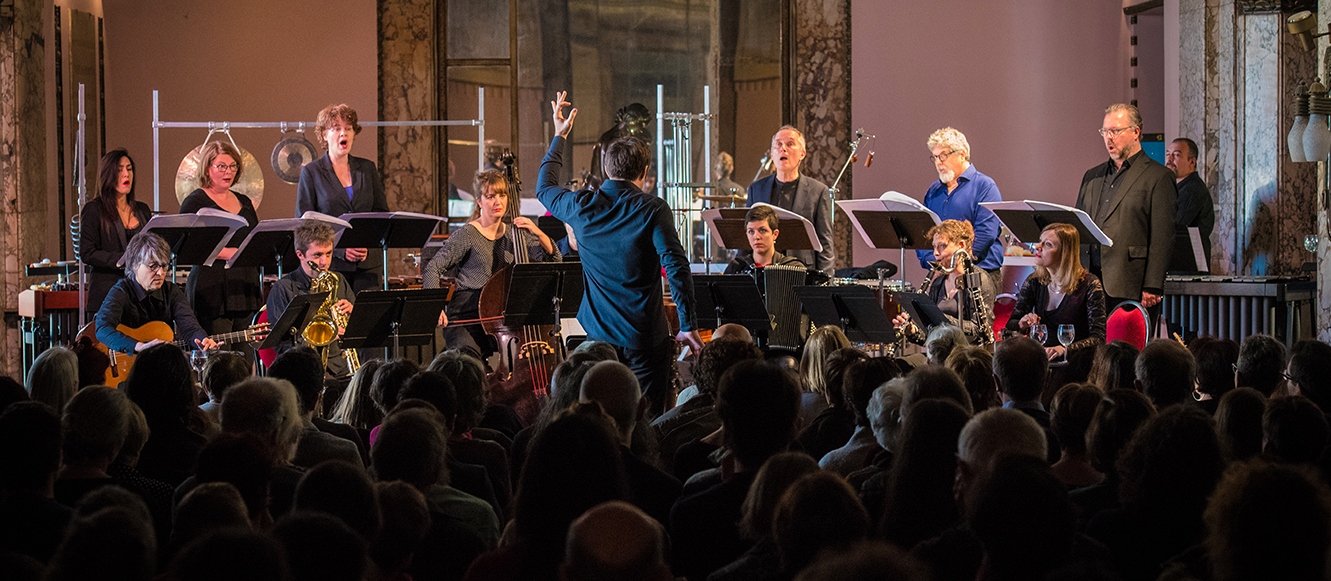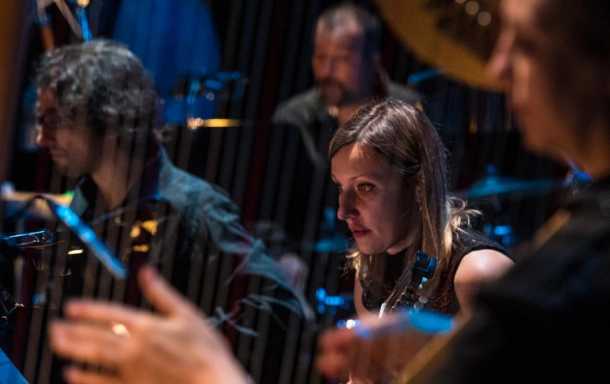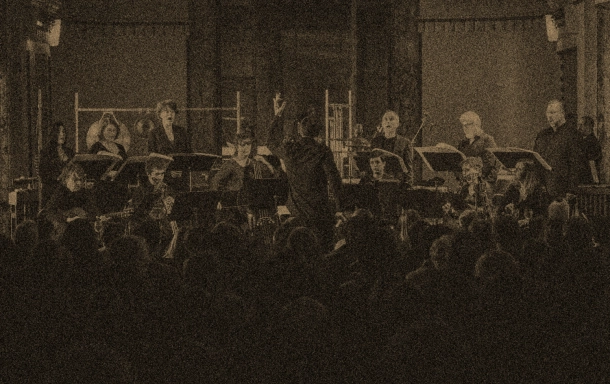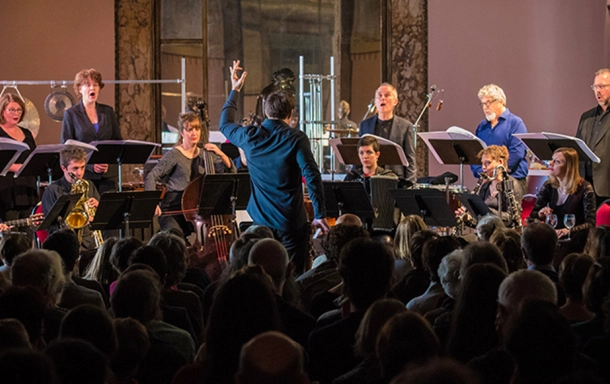World premiere at Venice Biennale, Italy.
Songs and voices is scheduled for the Propagations 2024 festival in Marseille in May.
In the work for electric ensemble Five Songs (Kafka's sirens), written in 2017 for Ensemble C Barré, the title alludes to - but is not a literal reference to - Franz Kafka's story Le silence des sirènes. In fact, Kafka's story isn't so much about telling an alternative history (who would say that the sirens didn't sing) as it is about suggesting a paradox, insinuating a doubt of perspective.
It's rather to this - to a possible paradoxical perspective - that the title alludes. This is a form articulated in five instrumental "songs", in which the poetic question that emerged was: what remains of singing when the voice disappears?
What can be the essence of singing, and how can we perceive singing when no one sings? This presence of song in the absence of a singing voice was the driving force behind instrumental sound research, a kind of aporia that - like Kafka's paradox - aimed to push back the limits of the instrumental "visible".
This first question naturally calls for a question that is in some ways the opposite: what is voice without song? The voice for its pure presence, devoid of its orphic function? The voice as instrumental body, and as body tout court, the voice as carnal presence that precedes and surpasses speech. A kind of apotropaic object that we would know without understanding.
The exploration of this other half of the question led to the integration of the vocal ensemble Neue Vocalsolisten, with whom Ensemble C Barré has been musically involved for several years, in this musical journey that takes place between these two extremes. Extreme absence and extreme presence, singing in the voice and the voice without singing. Between these two focal points of paradox lies perhaps what attracts Ulysses so much to approach the sirens.
This journey is structured in several moments that explore different aspects of the voice as a body, the voice as an instrumental body, the voice as song, and the voice that, by embodying the word, transforms, cancels and surpasses it, to form a total work lasting around 1h15.
Tour dates :
October 27, 2023, Biennale di Venezia, Italy - World premiere
March 26, 2024, B!ME - Biennale des Musiques Exploratrices du GRAME, Lyon, France
March 29, 2024, Ircam - Centre Georges Pompidou, Paris, France
May 4, 2024, Wittener Tage fur Neue Kammermusik, Witten, Germany
May 12, 2024, Festival Propagations - GMEM-CNCM, Marseille, France
July 19 or 20, 2024, Festival Eclat, Stuttgart, Germany
Ensemble C Barré
Commission
l'État Français with the support of the Ernst von Siemens Music Foundation and Sacem
Co-commission
Ensemble C Barré, the Venice Biennale, Le Grame, Ircam - Centre Pompidou, Wittener Tage Für Neue Kammermusik, GMEM - Centre National de création musicale, Festival Eclat de Stuttgart
Partnership
Neue Vocalsolisten

Neue Vocalsolisten
ensemble
Researchers, inventors, idealists. They work with specialist ensembles and radio orchestras, with opera houses, independent theaters, electronic studios, festival and concert organisers of modern music in Europe.
The Neue Vocalsolisten - an ensemble for contemporary vocal music founded in 1984 within the framework of Musik der Jahrhunderte - has been an artistically independent vocal chamber music ensemble since the year 2000. The seven soloists, ranging from coloratura soprano to countertenor and deep bass, devote all their creative power to their chamber music work in collaboration with composers and other performers.
A group of specialized singers completes the core team, depending on the cast. Research is at the center of their interests, searching for new tonalities, vocal techniques and forms of articulation; dialogue with composers has a prominent place. Each year, they ensure the creation of nearly 20 new works. Opera and interdisciplinary work involving electronics, video, visual arts and literature are part of the group's artistic project, as are collages that contrast elements of early and modern music.
Francesca Verunelli
composer
She studied composition with Rosario Mirigliano and piano with Stefano Fiuzzi at the Luigi Cherubini Conservatory in Florence where she graduated with honors. In 2005 she joined the advanced course of the National Academy of Santa Cecilia in Rome where she studied with Azio Corghi and graduated in 2007. The same year, her piece 4e48 (intavolature for Sarah Kane) is selected by the CEMAT to appear in its cd of electroacoustic works. In November, Luminal was premiered at the Auditorium of Rome by the Freon ensemble and En Mouvement (espace double), at the Arsenal of Metz by the Orchestre national de Lorraine conducted by Jacques Mercier.
In 2008, she joined the Cursus of Composition and Computer Music at Ircam where two new pieces with electronics were created: Interno Rosso con Figure for accordion and electronics premiered in 2009 by Anthony Millet and Play for ensemble and electronics premiered by the Ensemble intercontemporain in 2010.
As a research composer at Ircam in 2011-2012, she received a commission from the Institute for Unfolding, a string quartet with electronics created by the Arditti Quartet in March 2012 at the Biennale Musiques en scène in Lyon and performed again at the ManiFeste 2012 at Ircam. She has also collaborated with the Neue Vocalsolisten ensemble from Stuttgart at the Venice Biennale, with the RepertorioZero ensemble at the Milano Musica festival, with the Orchestre Philharmonique de Radio France, with the ensembles C Barré, Court-Circuit, ICE, Accentus...
She received the Art Mentor Foundation Lucerne Composition Competition Prize, in the form of a commission for the Orchestra of Lucerne. She completed a residency at the Villa Medicis during the 2016- 2017 season.
Teatro Piccolo Arsenale, Venice, Italy
Campo de la Tana, 216130122
Venezia VE
Sébastien Boin
artistic and musical direction
Francesca Verunelli
composition
C Barré
instrumental ensemble, composed of :
Annelise Clément
clarinet
Joël Versavaud
saxophone
Matthias Champon
trumpet
Elodie Soulard
accordion
ClaudioBettinelli
percussion
Natalia Korsak
mandolin
Rémy Reber
guitar
Eva Debonne
harp
Marine Rodallec
cello
Charlotte Testu
double bass
Neue Vocalsolisten Stuttgart
vocal ensemble, consisting of:
Johanna Vargas
coloratura soprano
Suzanne Leitz-Lorey
lyric soprano
Truike van der Poel
mezzo-soprano
Martin Nagy
tenor
Guillermo Anzorena
baritone
Andreas Fischer
bass
Antonello Pocetti
set design
Luigi Zerillo
lighting design
Max Bruckert
technical and technological coordination
Jean Millot
computer music production
Philippe Boinon
sound engineer
Bertrand Schacre
stage management







